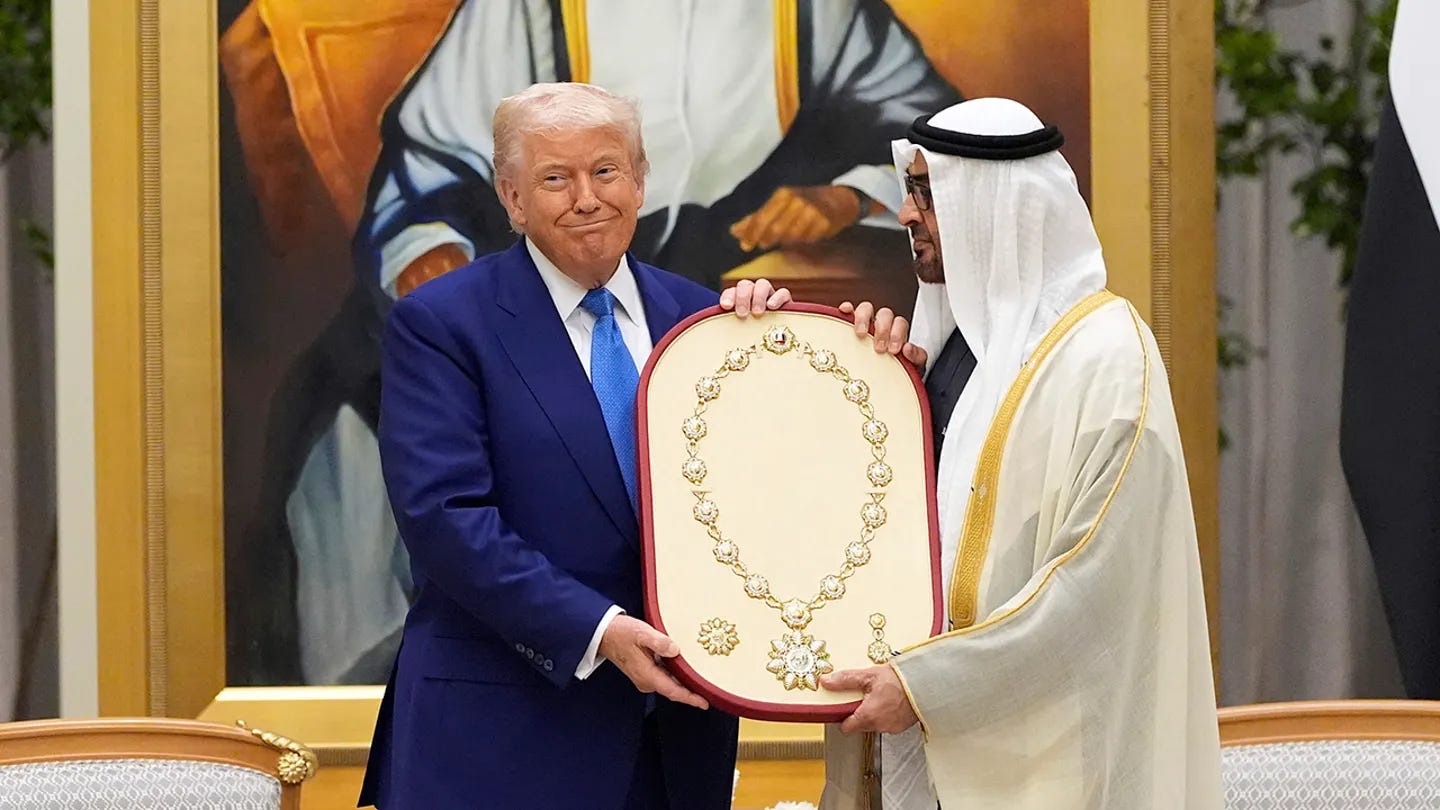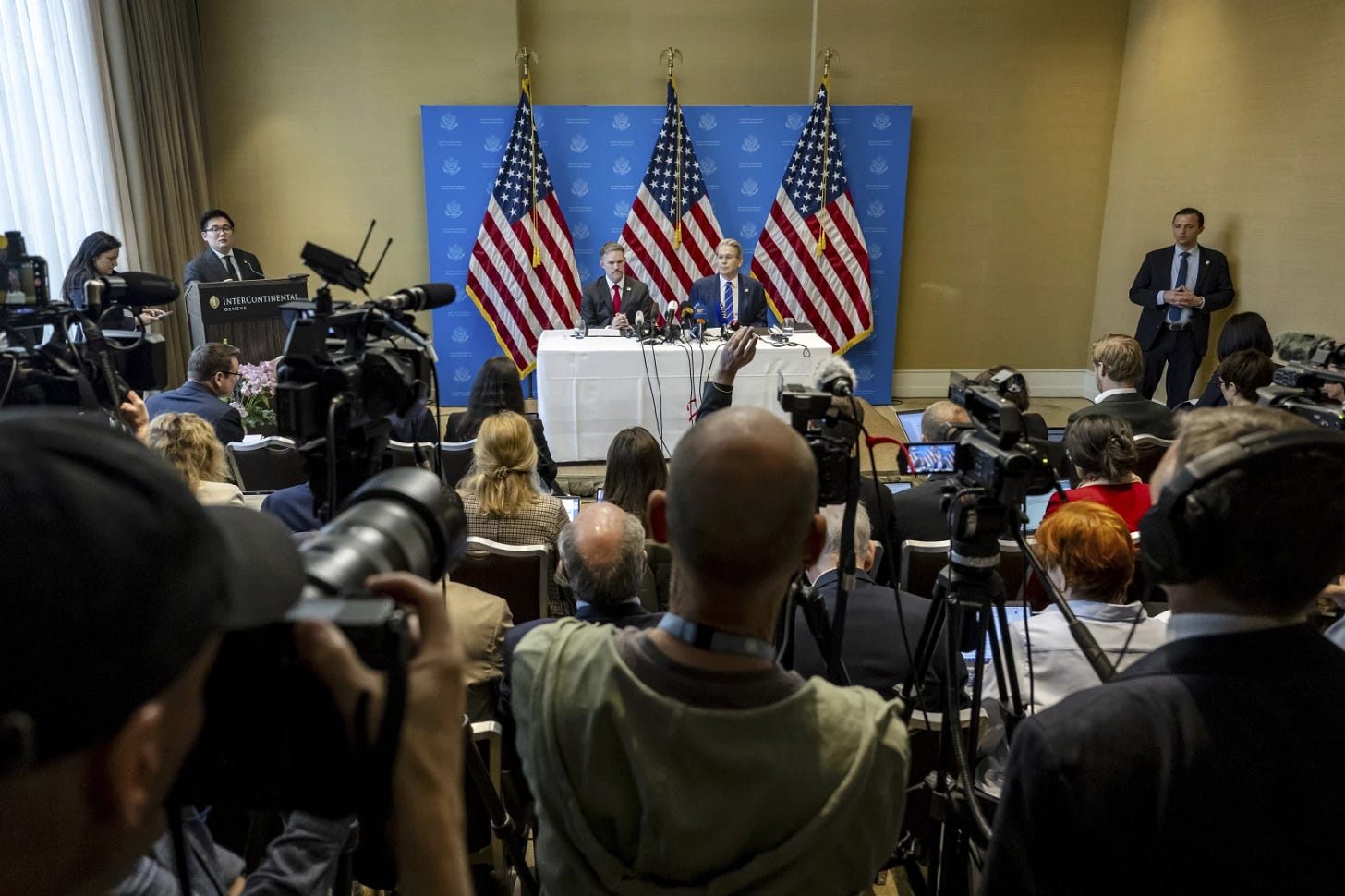Week 17 Under Trump: Tariffs Adjusted, Healthcare Orders, and Institutional Pressures
From trade easing with China to healthcare initiatives and federal actions on universities, Week 17 highlights continued shifts in policy and power.

Trump’s seventeenth week brought new developments in trade, healthcare, immigration, and education policy. Tariffs on Chinese goods were temporarily reduced from 145% to 30%, while China lowered its tariffs on U.S. imports from 125% to 10%. President Trump also signed an executive order aimed at lowering prescription drug prices in the United States, with cuts projected to range between 30% and 80%.
Meanwhile, Senate Democrats called for an investigation into Elon Musk’s company Starlink, alleging the satellite firm may have received preferential treatment in foreign trade agreements.
As anti-immigrant sentiment intensifies, the Department of Homeland Security (DHS) launched an investigation into California’s Cash Assistance Program for Immigrants (CAPI), alleging improper payments to undocumented immigrants dating back to 2021. That same day, Wisconsin Judge Hannah Dugan was indicted by a federal grand jury on charges of concealing an undocumented immigrant from arrest. Previous reporting from The Introspective documented Dugan’s initial arrest and her suspension by the Wisconsin Supreme Court.
Tensions between the Trump administration and Harvard University also escalated, with an additional $450 million in grants revoked amid ideological disputes. A prior report from The Introspective detailed billions in federal funding pulled over accusations of antisemitism. At the same time, as part of the administration’s broader push to downsize the federal government, the Environmental Protection Agency (EPA) announced plans to roll back Biden-era regulations on “forever chemicals” in drinking water.
Trade Wars, Healthcare, and Starlink
With the trade war ongoing, tariffs on Chinese goods were reduced from 145% to 30%, while a separate 20% tariff on fentanyl-related products remains in place. In response, China lowered its tariffs on U.S. imports from 125% to 10%.
“We have reached an agreement on a 90-day pause and substantially moved down the tariff levels. Both sides on the reciprocal tariffs will move their tariffs down 115%,” said Treasury Secretary Scott Bessent during a meeting in Switzerland.
“We had very productive talks, and I believe the venue—here in Lake Geneva—added great equanimity to what was a very positive process.”

In a statement, White House officials said that “the Parties will establish a mechanism to continue discussions about economic and trade relations,” easing tensions between the two countries. A previous Introspective report detailed Trump’s earlier move to impose a baseline 10% tariff on all U.S. trade partners.
At the same time, President Trump signed an executive order aimed at reducing prescription drug prices by aligning U.S. payments with those made by other countries. The order, Delivering Most-Favored-Nation Prescription Drug Pricing to American Patients, requires pharmaceutical companies to lower prices within 30 days or face potential regulatory action.
“One breast cancer drug costs Americans over $16,000 per bottle, but the same drug from the same factory, manufactured by the same company, is one-sixth that price in Australia and one-tenth that price in Sweden,” Trump said during a press conference.
“A common asthma drug costs almost $500 here in America but less than $40 in the United Kingdom … and the weight-loss drug Ozempic costs 10 times more in the United States than in the rest of the developed world. Ten times more. Why?”
Researchers praised the executive order, including Michael F. Cannon of the Cato Institute, who noted that Medicare and Medicaid often pay higher prices for prescription drugs than other countries.
“The price that Medicare and Medicaid should be paying for drugs is $0.00,” said Cannon in a press release.
“To the extent Trump’s executive order moves the prices Medicare pays for medicines closer to the ideal price of $0.00, it is a step in the right direction.”
However, some experts expressed doubts about whether pharmaceutical companies will comply.
“We’re unlikely to get the drug companies to voluntarily decrease their prices, and we’re not going to get the other countries to voluntarily increase their prices, right?” said Gerard Anderson, a professor at Johns Hopkins University, in a report by CNBC.
“Why would any drug company ever lower their prices voluntarily?”
Meanwhile, Senate Democrats called for an investigation into Elon Musk’s satellite company Starlink, alleging that it may have received preferential treatment in foreign trade agreements. The request follows Washington Post reports that the United States may have pressured nations affected by tariffs to work with the company.
“These reports indicate that Mr. Musk may be using his official role and his proximity to the President as leverage for his own personal financial benefit—even if it comes at the expense of American consumers and the nation's foreign policy interests,” wrote the senators in a letter addressed to Attorney General Pam Bondi; Acting Director of the Office of Government Ethics Jamieson Greer; Acting Inspector General of the State Department Arne Baker; and White House official Scott Gast.
“These actions raise questions about whether Mr. Musk or other administration officials may be violating ethics or other laws.”
The allegations followed Musk’s appearance at the Saudi-U.S. Investment Forum in Riyadh, where he announced that Saudi Arabia had approved Starlink for aviation and maritime use in the Middle East.
“Musk announced that Saudi Arabia approved Starlink, just as the White House and U.S. tech companies announced defense and trade agreements with Saudi Arabia and a Saudi company,” the senators wrote.
“Starlink stands to earn billions of dollars from unlocking access to these new markets.”
However, in a report by ABC News, White House spokesperson Harrison Fields dismissed the allegations.
“It is completely false to claim that Elon Musk had or has anything to do with deals involving Starlink. This is just more fake news from media outlets determined to invent conflicts of interest that don't exist,” Fields said.
“For the umpteenth time, President Trump will not tolerate any conflicts of interest, and every administration official is following ethical guidelines set by their respective agencies.”
A previous report from The Introspective detailed Musk’s plan to step down from the Department of Government Efficiency (DOGE) in May to refocus on Tesla.
Immigration
As anti-immigrant sentiment continues to unfold during President Trump’s second term, the Department of Homeland Security (DHS) has launched an investigation into California’s Cash Assistance Program for Immigrants (CAPI) for allegedly providing benefits to undocumented immigrants.
“Radical left politicians in California prioritize illegal aliens over our own citizens, including by giving illegal aliens access to cash benefits,” said Homeland Security Secretary Kristi Noem in a press release.
“The Trump administration is working to identify abuse and exploitation of public benefits and make sure those in this country illegally are not receiving federal benefits or other financial incentives to stay. If you are an illegal immigrant, you should leave now. The gravy train is over. While this subpoena focuses only on Los Angeles County, it is just the beginning.”
In an interview with ABC Los Angeles, Kevin R. Johnson, a professor at the University of California, Davis (UC Davis), said the Trump administration is pursuing the subpoena because federal funding is involved.
“There is some federal money attached, and that is why the Trump administration is seeking to determine whether or not the money is being spent consistent with the wishes of Congress,” Johnson said.
“The question here is whether there is any real evidence that the program has been abused in some way or whether unlawful immigrants are receiving any kind of benefits from the program.”
“There is no real reason to think that there is,” he added.
Meanwhile, following previous Introspective reports on the arrest of Wisconsin Judge Hannah Dugan for allegedly helping an undocumented immigrant avoid arrest, Dugan was indicted by a federal grand jury on charges of obstruction and concealing an individual from arrest.
“As she said after her unnecessary arrest, Judge Dugan asserts her innocence and looks forward to being vindicated in court,” said Dugan’s attorney, Craig Mastantuono, in a statement obtained by NBC News.
Dugan was previously suspended by the Wisconsin Supreme Court following her arrest in April.
University Funding and “Forever” Chemicals
Following a previous report from The Introspective detailing billions in federal funding pulled over accusations of antisemitism, the Trump administration has revoked another $450 million in grants from Harvard University.
“Harvard’s campus, once a symbol of academic prestige, has become a breeding ground for virtue signaling and discrimination,” read a statement signed by officials from the Department of Education, the Department of Health and Human Services (HHS), and the General Services Administration.
“There is a dark problem on Harvard's campus, and by prioritizing appeasement over accountability, institutional leaders have forfeited the school's claim to taxpayer support.”
In a press release signed by Harvard President Alan Garber and Provost John F. Manning, the officials stated the university would spend up to $250 million in the upcoming year to offset disruptions to research efforts.
“Although we cannot absorb the entire cost of the suspended or canceled federal funds, we will mobilize financial resources to support critical research activity,” wrote Garber and Manning, adding that they would seek alternative sources of funding.
Garber has taken a 25% pay cut as the university undergoes a lawsuit against the Trump administration. According to The Harvard Crimson, Harvard presidents have historically earned up to $1 million per year.
Meanwhile, as Trump’s initiative to downsize the federal government continues, the Environmental Protection Agency (EPA) announced plans to weaken limits on “forever chemicals”—synthetic substances that do not easily break down—in drinking water. The new policy rolls back Biden-era regulations for perfluoroalkyl and polyfluoroalkyl substances (PFOA and PFAS).
“We are on a path to uphold the agency’s nationwide standards to protect Americans from PFOA and PFOS in their water. At the same time, we will work to provide common-sense flexibility in the form of additional time for compliance,” said EPA Administrator Lee Zeldin.
A report from the Associated Press found that 12% of water utilities in the U.S. exceed the Biden-era limits.






